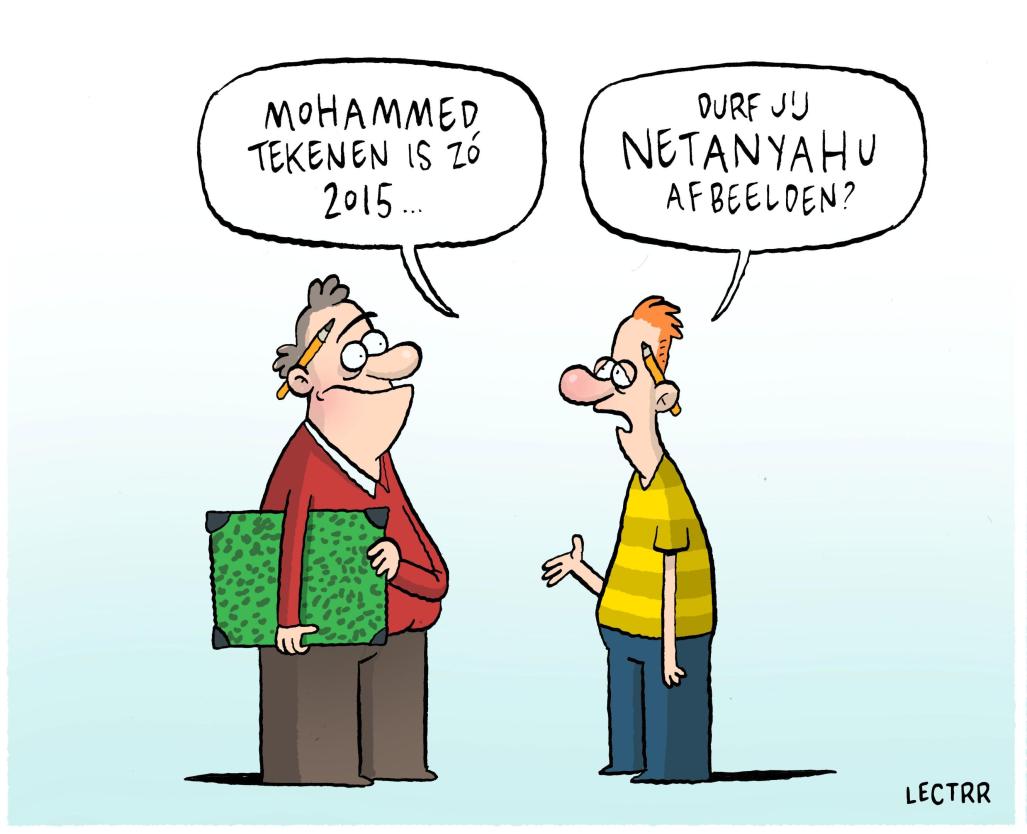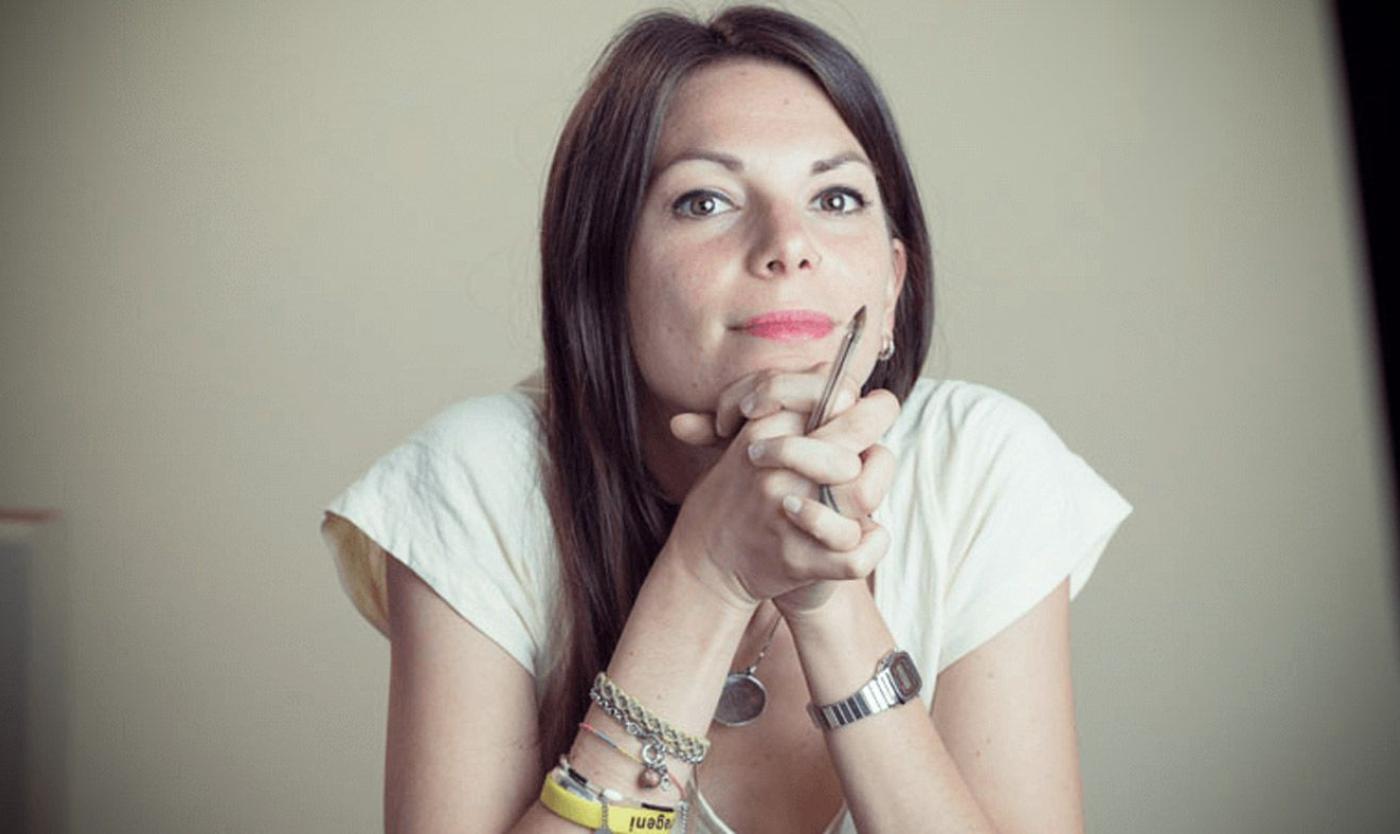
During Difference Day on 2 May, cartoonist Lectrr will take part in the panel discussion “Where to draw the line: hate speech vs free speech in cartoons”. He’s already had to deal with opposition, threats and censorship. So where does he draw the line? “Cartoons can be painful, totally over the top, nauseating or just not funny.”
Read more about Difference Day and book your ticket
“When ISIS were carrying out their attacks, there was pressure on cartoonists, but now it’s on a whole other scale. Back then it was aimed at a few individuals, and there was a sort of ‘bad boy culture’ among many cartoonists, the sense that we can take on the world. That was 10 years ago. Now we live in a world where autocratic regimes are specifically targeting journalists and press cartoonists. In the past few months, things have become problematic under Trump. Last week, the organisation Cartoonist Rights advised people not to travel to the US if their work was critical of Trump. American customs officers have the right to read the contents of someone’s phone. As a result, some of our colleagues have been held in pre-charge detention, despite having the right visas. We’re already seeing these scenarios in this phase of an autocratic America.”
But isn’t Trump a strong advocate of freedom of speech?
“You often hear this nonsense among the far right. Yet they call for bans, put pressure on the cultural sector, restrict universities, all under the banner of ‘freedom of speech’. The mayor of Ninove, Guy D’haeseleer, wants to interfere with the book selection in the local library. The majority of people see through such plans, but there will come a point when it’s too late.”
“Because the press in America is either Democrat or Republican, half of the time they aren’t critical”
Do you take any notice of this pressure?
“I was due to give a lecture in New York, and now I’m not going. A few weeks ago, colleagues in the US made it clear that it was becoming impossible to do their work. I’ve been told that my work won’t be published anywhere if it’s too critical. Even before Trump came to power, many papers were being cautious. While they should be covering deportations and the ongoing erosion of power, instead they publish cartoons about a country music star who tripped on the red carpet.”
Do you think that’s cowardly?
“I think a lot of people live with the idea that ‘it will blow over’. You also have to see it in the tradition of how American press cartoonists work. We’re used to being critical here, and a cartoonist by definition is a contrarian. Because the press in American is either Democrat or Republican, half the time they aren’t critical, depending on which party delivers the president. And now they’re holding back for fear of reprisals. There’s a much greater culture of entertainment. Of course there are outliers in America too, cartoonists who are openly critical. And who rightly ask the question of why you would create cartoons that aren’t relevant. This is the function of a cartoonist: to provoke, challenge and be relevant.”
Do you get more reaction to your work these days than you used to?
“I get reactions every day, but that’s great. If you believe in freedom of expression, you have to be able to handle criticism. It’s also proof that your work is being seen. For me, it would be much worse to have no reaction. I’m not saying it’s nice to get hate mail. Sometimes there are responses that make me wonder if I should go to the police. I’ve also had my share of death threats. But you have to take the rough with the smooth.”
“It's a reaction I get very often: not funny. That's true, I then say. Look at the news, there's nothing funny about that either”
Have you ever had cartoons rejected?
“Not here. I have an agreement with De Standaard that I can draw what I want. In other countries, my work has been rejected. But I don’t want to jump to call it censorship, because a newspaper always has its editorial line. An editor has the right to steer a particular course. A cartoonist doesn’t have to stick to it, but you do need to fit in. My view is that if a cartoon can’t be published the way I want it, then I won’t let it be published.”
Are there some topics you avoid?
“No. My first death threat came from an extremist Islamist network, the day after the attacks on Charlie Hebdo magazine. I remember that I had to give the police the names of my children as possible terrorist targets while I was coming up with a cartoon for the next day. Right then, I wondered if I should avoid the subject, but I chose not to. A week after Charlie Hebdo, lots of cartoonists came together for a discussion. Many of them thought we should censor ourselves. Soon after, Marec drew an image of Mohammed. While I’m drawing, I don’t always know if the cartoon will be harsh or not. A while ago I did one about a mass grave in a swimming pool, and I knew it would disgust people. And that’s exactly the reason why you should publish it – it’s only disgusting because these graves exist. Cartoons can be painful, completely over the top, nauseating or just not funny. That’s a reaction I get a lot: not funny. That’s right, I say. Look at the news, there’s nothing funny about that, either.”

“I don’t regret any of my cartoons, but I often regret the ones that weren’t published”
Do you respond to criticism?
“I used to do that more. It depends on how reasonable it is. If I can see that people genuinely want a discussion, then I try to. But I’d rather give a talk, then you’re having a dialogue with a group. I don’t want to be the man pointing the finger at people. To be honest, my cartoons aren’t always 100% my opinion. And I don’t want to force my viewpoint on someone. It’s important that we understand each other’s view. Since the reaction of Israel to the attacks by Hamas on 7 October, I’ve made some very harsh cartoons and so received lots of reactions from Jewish groups. Lots of hate mail, but also lots of reasonable responses. If you get a reaction from someone who personally knew someone who was slaughtered on 7 October, you don’t start talking about how it’s been going on like this for 50 or 60 years. You have to show understanding for their pain. But I can’t and won’t be anecdotal in my work, especially not on issues like this. You can’t get away with ‘there’s a Palestinian and his nephew living in my street…’. A cartoon also can’t offer a solution. That’s not what we’re here for, we’re the ones asking questions, not the ones providing answers. That’s why we have politicians and scientists. We put our finger on the problem. My cartoon isn’t a conclusion but the starting point for a thinking process. There is beauty in a dialogue, and a cartoon offers that potential.”
Have you ever regretted one of your cartoons?
“No. I rarely look backwards, I don’t have enough time for reflection. If I do regret anything in a cartoon, it’s usually about form, how poorly I drew it, for example. I do often regret the cartoons that I didn’t publish, though. When I’m drawing, it’s often difficult to judge how relevant the cartoon will be, as the news moves unbelievably quickly. Especially with someone like Trump. I file a cartoon about him to the newspaper, then this man wakes up on the other side of the ocean and by the time I get up the world is completely different. In my archives there are cartoons that I drew 10 or 20 years ago. Like about Zwarte Piet before the conversations about correctness. I drew him with fat lips because society wasn’t talking about decolonisation, so neither was I. But I’m not going to cleanse my archives or make them politically correct, because then I’d have to stop drawing. They’re historical documents: I made them, so they exist. Work shouldn’t be hidden, even if it missed the mark at the time. I don’t have to pay that bill. Cartoons are part of how we looked at the world a certain point in time.”
“As Belgians, we’ve been dominated by just about everyone, and that makes us distrustful of power. We prefer to do our own thing”
Are you worried that we could end up with an American-style situation here?
“Definitely. We have to deal with the convulsions of an extreme neoliberal system that works for 1% of the population and for everyone else it’s a load of crap, to put it mildly. At the same time, I believe in a pendulum movement. In that sense, I’m hopeful. We’ve overcome the greatest evil in the past. We’re making the same mistakes, but we’ll learn from them again. Then we’ll realise that we need to show solidarity and humanity towards everyone. Equality and freedom of expression are important to me. As long as I can play my part, and others do that too, I believe we can get through it. Autocracy is based on lies and repression, and that never lasts. It’s insane, it’s too mad for words what you see in some parts of the world. The job of a cartoonist is to keep emphasising the world we live in.”
How Belgian is your work?
“If you compare Belgian cartoonists with those from elsewhere, we’re outliers. We’re both very sharp and very naïve, and the absurdity flows from us. The surrealism of what it means to be Belgian can’t easily be explained abroad. You can see it in the work of our cartoonists. Before the attacks on Charlie Hebdo, I barely knew my colleagues in Brussels and Wallonia. Now we often get together and then you can see, in French too, that we look at issues in the same way. Through our comic strip culture from the past century, there’s a lot of language play in our work. It’s often based on spellings or distortions in the language. You also see much less of the complete rejection of power abroad, certainly in the US where they’re practically employed by one of the two political parties. But in other countries too, it seems as if cartoonists belong to a party and clearly express themselves in a particular political discourse. In Belgium, that’s unthinkable. We’ve been ruled over by just about everyone, and that makes us distrustful of power. We prefer to do our own thing.”
Curious about the forces shaping world politics?
Discover VUB's study programmes:
Microcredentials and postgraduates: Democracy: challenges and futures EU Policy Making
Bachelors: Politieke wetenschappen Social Sciences
Masters: European Integration European and International Governance
ALL PROGRAMMES IN ENGLISH ALL PROGRAMMES IN DUCTH

